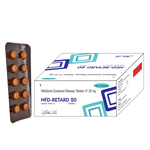nefidinol
Introduction to Nefidinol
Nefidinol is a medication primarily used to manage hypertension and angina. It belongs to a class of drugs known as calcium channel blockers, which work by relaxing the blood vessels, allowing blood to flow more easily, and reducing the heart's workload. This medication is available in various forms, including tablets, capsules, and in some cases, as an injectable solution. Nefidinol is a trusted choice for many healthcare providers due to its effectiveness in controlling blood pressure and preventing heart-related complications. Always consult with a healthcare professional before starting any new medication.
Composition of Nefidinol
The active ingredient in Nefidinol is Nifedipine, present in a 20mg dosage. Nifedipine is a potent calcium channel blocker that plays a crucial role in dilating blood vessels. By inhibiting the influx of calcium ions into vascular smooth muscle and cardiac muscle, Nifedipine reduces the force of contraction and lowers blood pressure. This mechanism helps alleviate the symptoms of hypertension and angina, making Nefidinol an effective treatment option for these conditions.
Uses for Nefidinol
- Treatment of high blood pressure (hypertension)
- Management of chronic stable angina
- Relief of variant angina (Prinzmetal's angina)
- Improvement of exercise tolerance in patients with angina
Side Effects of Nefidinol
- Headache
- Dizziness or lightheadedness
- Flushing
- Swelling of the ankles or feet
- Nausea
- Fatigue
- Shortness of breath
Precautions of Nefidinol
Before taking Nefidinol, inform your healthcare provider if you have any allergies, medical conditions, or if you are taking any other medications. It's crucial to avoid alcohol as it can enhance the side effects of the medication. Pregnant or breastfeeding women should consult their doctor before using Nefidinol. Regular monitoring of blood pressure is advised to ensure the medication is working effectively. Do not abruptly stop taking Nefidinol without consulting your healthcare provider, as it may worsen your condition.
Conclusion
Nefidinol, with its active ingredient Nifedipine, is a reliable medication for managing hypertension and angina. Available in tablets, capsules, and injectable forms, it offers flexibility in administration to suit patient needs. While effective, it's essential to use Nefidinol under medical supervision to minimize side effects and maximize benefits. Always adhere to your healthcare provider's instructions and report any adverse reactions promptly. With proper use, Nefidinol can significantly improve quality of life for those dealing with cardiovascular issues.
Similar Medicines
Available in 2 variations

Nefidinol Retard 20mg Tablet 10s
Nefidinol Retard 20mg Tablet 10s
strip of 10 tablet

Nefidinol Retard 10mg Tablet 10s
strip of 10 tablets
Related Faqs

Do I need to change my diet while taking Nicardia?
Yes, making small changes to your diet can help your medicine work better. You must take a low sodium and low-fat diet, and adhere to the lifestyle changes as advised by your doctor. You should also avoid eating grapefruit (chakotra) or drinking grapefruit juice while taking Nicardia.

Is Nicardia a diuretic?
No, Nicardia is not a diuretic medication. However, some evidence indicates that Nicardia has a partial diuretic property which may result in increased sodium loss through urine. It is a medication which relaxes the blood vessels by directly acting on them. This helps to decrease the blood pressure of the individual. As a result, blood flows more easily and lowers blood pressure, which helps to reduce the strain or pressure on your heart.

Do I need to change my diet while taking Depin?
Yes, making small changes to your diet can help your medicine work better. You must take a low sodium and low-fat diet, and adhere to the lifestyle changes as advised by your doctor. You should also avoid eating grapefruit (chakotra) or drinking grapefruit juice while taking Depin.

Can Depin cause liver damage?
Yes,Depin can cause liver damage in some cases, but this is very rare. However, some people may develop a rise in liver enzymes after taking Depin. Let your doctor know if you notice any such changes in your recent lab tests. Do not start this medication without consulting your doctor and do inform him if you have any history of liver disease or liver damage. This is because, in case of liver damage, dose adjustment may be required.

Can Calcigard be used in pregnancy and nursing mothers?
It is advised that you should consult your doctor before taking this medicine if you are pregnant, planning to become pregnant or breastfeeding. It should be used only if prescribed by the doctor in case of pregnancy. Studies have shown significant risks to the developing baby and it is given only if the benefits are clearly more than the risks involved.
Related Posts

1:15
10 Health Benefits of Hard-Boiled Eggs: Nutrition!

1:15
Ketogenic Diet for Weight Loss! The Key to Healthy & Effective Weight Loss!

1:15
The Mediterranean diet: Benefits and How to follow the Mediterranean diet!

1:15
Are Multivitamins Safe? Know the Risks Before You Take Them!

1:15
Dyslexia Symptoms & Diagnosis – Know the Signs!
Disclaimer : This information is not a substitute for medical advice. Consult your healthcare provider before making any changes to your treatment . Do not ignore or delay professional medical advice based on anything you have seen or read on Medwiki.
nefidinol
Prescription Required
Manufacturer :
Knoll Pharmaceuticals LtdComposition :



















.svg)
